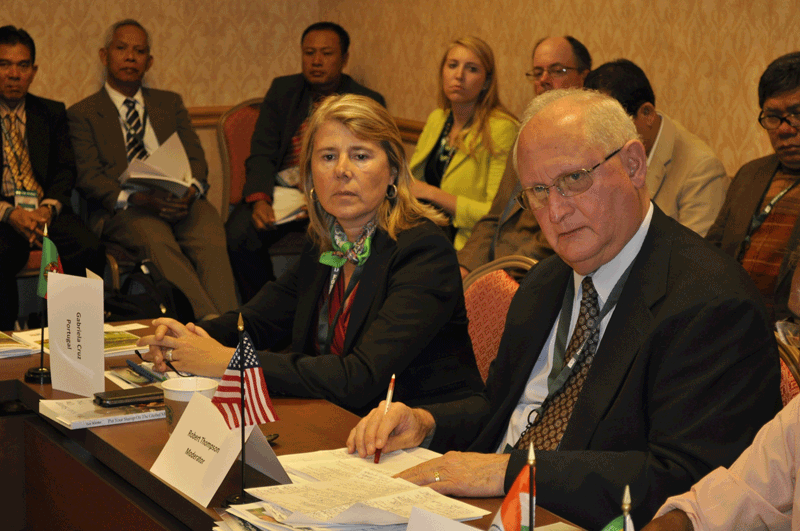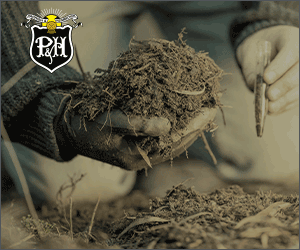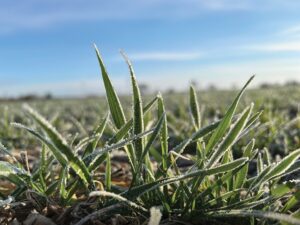Sustainable farming
A FARMING STORY FROM PORTUGAL
GABRIELA CRUZ IS a fourth generation Portuguese farmer – one of four daughters to parents with no sons – who has been managing the family farm for the past 24 years. She produces cereals, mainly wheat, barley and corn; clover and lapinos for seed; sunflowers; and beef livestock. Cruz loves farm life, but she also faces a number of challenges. Namely, she is looking for ways to meet Europe’s demands for non-GM crops grown in a sustainable manner while remaining profitable.

Farmers in Portugal often face very severe droughts, says Cruz, who was part of a global farmer roundtable at this year’s World Food Prize event in Des Moines, Iowa. “Soils are poor. We have a lot of erosion. In my area, we have 450 millimetres of rain throughout the year and we have very hot summers.”
As climate changes globally, it is expected that Portugal’s average temperature will rise, rainfall will decrease in the springtime, but increase in the fall, and droughts and heat waves will occur more often. As a result, it is expected that more erosion will occur, resulting in the loss of fertility, and eventually, productivity.
“So what does Europe expect from me?” she asks. “To be a super woman, which I already am just because I am a farmer. Europe asks me to practice sustainable farming, which means to produce safe food, feed and service the community, while protecting natural resources and remaining profitable.”
“To reduce water consumption, to reduce energy consumption, fuel and electricity, to reduce nitrogen and phosphorus consumption, to reduce pesticide use, to reduce erosion, and to reduce gas emissions,” she continues. “Why is Europe asking all of this? To some extent, because it does not have any idea what farming is.”
MAKING CHANGES
Despite the challenges, Cruz has been able to meet Europe’s demands by making changes on her farm. She has chosen to grow a few conventional crops, using agrochemicals to produce them. She uses an integrated pest management system, and chooses to use the one biotech crop that is permissible under European regulations – Bt corn.
Through the use of Bt corn, Cruz has been able to reduce her use of insecticides against corn borer by 400-600 liters per year. On top of that, she has been able to reduce her use of agrochemicals by 750 liters in total. Through the use of integrated pest management, she has been able to further reduce her use of pesticides.
Cruz also uses no-till and minimum-till practices, and plants bio-diverse pastures using legumes that help to sequester carbon. The results of the changes she has made are visible on the farm. Soil erosion has decreased and soil fertility has gone up. Cruz has reduced her water consumption by over 10 percent per year and reduced electricity usage. That reduction has led to a 65 tonne per year reduction in carbon emissions.
She knows she could do better, though.
“I need to continue to reduce water and energy consumption,” she says. “I need to reduce pesticide use, I need to reduce nitrogen and phosphorus use, and I need to reduce carbon emissions.”
THE NEED FOR SCIENCE
To do this, Cruz says she needs genetics. She needs crops that are armed with drought tolerance. She needs crops that are resistant to pests and diseases. She needs crops that use nitrogen more efficiently. And she needs crops that are resistance to herbicides.
“So when is it my turn to ask Europe [for something]?” asks Cruz. “I think I have the right to ask Europe for many things – but two very important ones.”
What are her requests? First, she wants freedom of choice for farmers to choose which technologies they want to use. “And second, I ask Europe that all of their decisions are made using science,” she says.
Cruz’s third and final wish has nothing to do with Europe at all, though. It is her hope that researchers and companies continue to bring forward new biotech crops so that farmers like herself have the tools that they need to farm viably. •
























